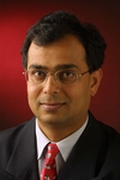

World Trade Centre Disaster -
Building Performance Investigation
Thurs, Feb. 27, 2003
Battery Hotel and Suites, St. John's, NL
This NLT Breakfast Presentation (CSCE members ONLY)
Schedule:
7:00 - 7:15 am - Registration (Meet & Greet)
7:15 - 7:40 am Buffet Breakfast
7:40 - 7:45 am - Section Chair welcome and introduction of Dr. Venkatesh Kodur
7:45 - 8:30 am - WTC disaster - An Overview of Building Performance Investigation
8:30 - 8:45 am - Questions and Wrap-Up
Background Summary for Presentation
The September 11th terrorist incidents have caused colossal destruction and significant damage to a number of buildings in the World Trade Centre (WTC) vicinity in New York. To investigate the collapse/damage to the buildings, and also to study the performance of buildings, a number of professional organisations, city (NYC), State agencies and the Federal Emergency Management Agency (FEMA) have come together under one umbrella and have established an "Experts Team" called BPAT (Building Performance Assessment Team. Dr. Venkatesh Kodur, MCSCE, the only member outside of the U.S.A., was the only non-American invited to join the experts' team.
The investigation consisted of visiting Ground Zero, a survey of the WTC site, land-fill and steel recycling centers, review of videotape records, eyewitness accounts, interviews with building design teams, and analysis using computer models. Based on this information, the team has documented a detailed report. On May 1st, 2002, the results and recommendations of the BPAT investigation into the collapse of the World Trade Centre were presented to the Science Committee of the U.S. Congress.
An overview of the results from the building performance investigation of the World Trade Center
disaster will be presented. The overall damage to buildings and infrastructure, in the vicinity of WTC,
will be discussed. The main features of the WTC complex and surrounding buildings will be reviewed.
The factors that led to the collapse of various building will be explained. Based on the results from
preliminary analysis, the role of structural and fire issues, which were crucial in the collapse of the
twin towers, will be discussed. The main conclusions and proposed recommendations from the BPAT study
will be discussed.

Dr. Venkatesh Kodur is a Scientist (Senior Research Officer) at the Institute of Research in Construction
at the National Research Council of Canada, Ottawa. He received his B.E. from Bangalore University,
M.Sc. and Ph.D. degrees from Queen's University at Kingston, Canada. His expertise includes laboratory
testing and numerical modelling for the evaluation of fire resistance of structural members and non-linear
design and analysis of structures. He has published over 125 papers in structural and fire resistance
areas. He is an adjunct Professor at Queen's University, Canada, Chairman of the ASCE Committee on
Structural Fire Protection, member of ACI Fire Resistance Standards and CSA Committee on FRP Structural
Components for Buildings.
Dr. Kodur is a leading world expert in the areas of fire resistance and the effect of fire on building materials. He has led international collaborative research projects with Taiwan, UK, Belgium and USA. He has delivered invited keynote presentations at international conferences in Canada, USA, Taiwan, Malaysia and Spain and has won awards including the "NATO Award for Collaborative Research". In September 2001, Dr. Kodur was invited to join the "Experts Team" established to investigate the WTC disaster as a result of September 11 incidents. He is the only non-American expert invited to join the high profile and biggest-ever building investigations. The report, including recommendations, from this investigation has been submitted to US Congressional committees.
Further details on this workshop will be posted as they become available.
Last Updated January 25, 2003 1:30:50 AM